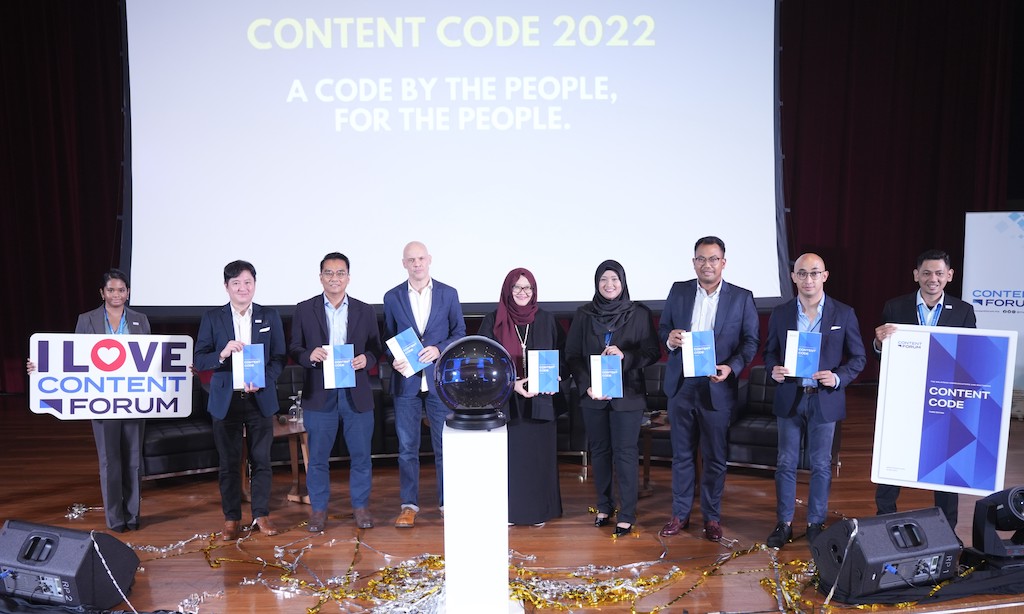As the content sphere grows ever larger with multiple creators pushing content through, there is a crucial need for more effective regulation.
Merely relying on third-party controls over content is no longer a viable option, especially when anyone and everyone can become content creators in a digital realm where the fight for more clicks and views is increasingly rampant.
To facilitate and encourage the habit of self-regulation, the Content Forum officially launched the new and revamped Content Code 2022, which outlines best practices and ethical standards for creating and curating content.
The Code, which was first established in 2004 under the auspices of the Malaysian Communications and Multimedia Commission (MCMC), recently underwent a revamp to keep up with the changing times while igniting important conversations among users today.
This included a nationwide public-consultation exercise where feedback was collected through multiple townhalls and dialogue sessions with industry players and members of the public.
As a result, some key guidelines were added to the Code to address growing pertinent issues, including the exploitation of religion in advertising products, the ethical reporting of suicide in the news, addressing advertising by influencers, circumventing pressing concerns around advertising for children, tackling online abuse and gender-based violence and accessibility of content for persons with disabilities (PWD).
With these guidelines in place, harmful content and misinformation can be more effectively avoided.
To shed some light on the importance of self-regulation and the Content Code 2022, a dialogue session titled ‘Content: Who’s in Control’ was held in conjunction with the Code’s launch. Organised by the Content Forum, panellists from various fields in the content industry shared their experience and thoughts on content regulation.
The panellists included Euan Smith, Group CEO Designate from Astro, Mediha Mahmood, Executive Director of the Content Forum, Ruben Hattari, Director of Public Policy in Netflix, Nini Yusof, Deputy Chief Executive Officer, Media Prima TV Networks and Dinesh Ratnam, Country Manager of iQiyi.
Overall, the panellists agreed that self-regulation is vital towards building a more robust and healthy content landscape in Malaysia, placing it on par with global best practices.
While there is a shift in how content is created and consumed in this technological era compared to traditional media, the panellists believed that this vast content space is not all bad as it allows for more freedom of expression, creation and flexibility. However, this must be moderated and curated via self-regulation for healthier content growth.

“We’re a huge fan of self-regulation, and we have been doing it since 2004. We take it super seriously as we make sure to adhere to the code’s guidelines to maintain good standards in our editorials.
We are extremely pro-self-regulation because we think that it works and it gives editorial more freedom and flexibility to create safe content,” said Euan Smith.
Furthermore, he sees the emergence of new content platforms such as OTTs, TikTok and YouTube as opportunities rather than threats to traditional paid TV because it allows them to expand their content and reach.
“It has allowed us to develop our platform with more aggregation of the apps, and it gives us the opportunity to reinvent ourselves from a satellite TV provider to something much richer. We love the opportunities and competition but all we ask for is a level playing field. This is where self-regulation comes into play,” he said.

Echoing his thoughts was Ruben Hattari, who strongly believes that everyone is responsible for the content they create and as such, self-regulation is a must. “At Netflix, we have certain obligations to ensure the trust is still there as a pioneer in video streaming. I think the bottom line here is still self-regulation.
At the end of the day, to the general public, they would know that we have all the measurements in place as a platform and collectively as an industry to push out content based on the right code of practices. Our customers are also well protected from content that they are not supposed to be watching,” he said.
To him, nothing remains constant in the media industry as things are always evolving and it is up to them to transform their business and services to keep up with changing times. “Something we realised over the years is that the best kind of content is no longer from Hollywood. Localised content is now on the rise.
With the titles that are coming out of Malaysia, I believe that there is an opportunity there to take our content to the global stage,” he said.

Meanwhile, Dinesh Ratnam, who operates on iQiyi’s global platform said that self-regulation has allowed them to take global influences and fuse it with the local culture. “We’re a global platform that also invests in local content so being able to practice self-regulation has really allowed us to blend global and local influences together because we know what can or cannot be done.
Knowing that there are certain baselines and principles to adhere to makes a lot of sense for the Malaysian content industry to bloom and blossom,” he said.
He added that self-regulation is crucial, especially for short-form videos like those on TikTok. “Short-form videos are on the rise; it is seeing a steady curve upwards. People can spend hours on TikTok watching short videos that may or may not be appropriate for consumption.
To me, content is like a buffet, it’s like food. Some content you may like and some you might not and there is also a fusion of content. With iQiyi, a lot of people are consuming our content on TikTok – basically user-generated content that gets millions of views. It is a good thing because this is where we can also expand our reach,” he said.

Nini Yusof, meanwhile, commended the Content Forum for coming up with the Content Code as without it, they would be at a loss on content that is deemed appropriate or not.
“We produce 5,000 hours’ worth of fresh content annually and there is no way we can send all of the content to the Malaysian Film Censorship Board for approval. This is where self-regulation comes in as we must be responsible for the content created,” she said.
She also welcomed the emergence of new forms of media as it is a wonderful addition for the industry. “For one it gives us access to new kinds of content and number two, we have access to new content creators who are different from the production houses we usually engage with.
Also, we see a diversity for our advertisers to work together with us and we can learn from the independent creators,” she said and further applauded the Content Code for also including influencers, who now play a pivotal role in marketing communications.
During the session, panellists also shared how content guidelines are different in various countries and in order to push Malaysian content globally, certain measures and adjustments must be made. What may seem culturally or locally appropriate in Malaysia may not be well-received overseas and vice-versa.
The dialogue was further enhanced by questions from the audience, many of whom asked about the role of state censorship in the face of self-regulation.

“A lot of people assume that state censorship and self-regulation are two things that oppose each other, and that’s not entirely true. Self-regulation was introduced globally for the content industry to address the various demands, preferences and tolerance levels of individual consumers.
It allows us all to make our own choices with regards to the content we consume from the vast offerings out there. However, there are certain content that should not ever be included in the offerings.
Content that are against the law like pirated content, pornography, child exploitation, content that incites hate and violence. This is where the government continues to play a very important role to protect the community and keep the content ecosystem safe.” said Mediha Mahmood.
Also present at the event launch was a representative from the Malaysian Communications and Multimedia Commission (MCMC) who opined that the Content Code revamp is a timely one to address various issues that have surfaced over the years.
MARKETING Magazine is not responsible for the content of external sites.









